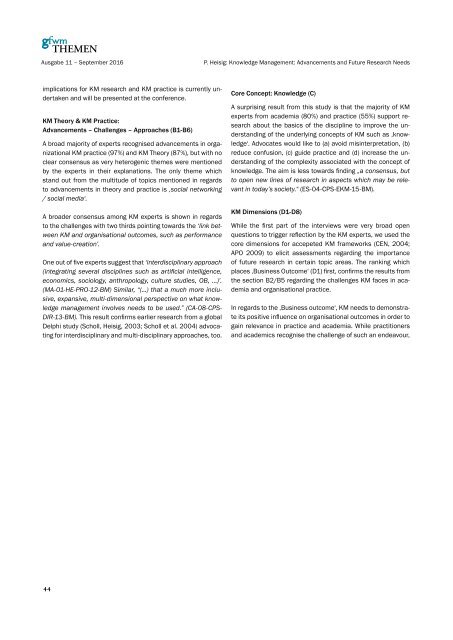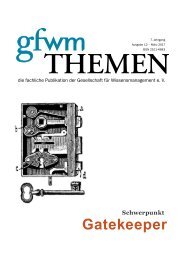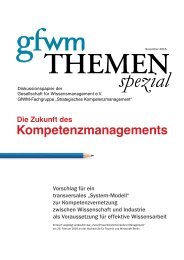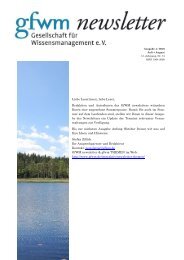gfwmTHEMEN11_Sep2016
Sie wollen auch ein ePaper? Erhöhen Sie die Reichweite Ihrer Titel.
YUMPU macht aus Druck-PDFs automatisch weboptimierte ePaper, die Google liebt.
eine Fachpublikation der Gesellschaft für Wissensmanagement e.V.<br />
Ausgabe 11 – September 2016<br />
P. Heisig: Knowledge Management: Advancements and Future Research Needs<br />
implications for KM research and KM practice is currently undertaken<br />
and will be presented at the conference.<br />
KM Theory & KM Practice:<br />
Advancements – Challenges – Approaches (B1-B6)<br />
A broad majority of experts recognised advancements in organizational<br />
KM practice (97%) and KM Theory (87%), but with no<br />
clear consensus as very heterogenic themes were mentioned<br />
by the experts in their explanations. The only theme which<br />
stand out from the multitude of topics mentioned in regards<br />
to advancements in theory and practice is ‚social networking<br />
/ social media‘.<br />
A broader consensus among KM experts is shown in regards<br />
to the challenges with two thirds pointing towards the ‘link between<br />
KM and organisational outcomes, such as performance<br />
and value-creation’.<br />
One out of five experts suggest that ‘interdisciplinary approach<br />
(integrating several disciplines such as artificial intelligence,<br />
economics, sociology, anthropology, culture studies, OB, ...)’.<br />
(MA-01-HE-PRO-12-BM) Similar, “(…) that a much more inclusive,<br />
expansive, multi-dimensional perspective on what knowledge<br />
management involves needs to be used.” (CA-08-CPS-<br />
DIR-13-BM). This result confirms earlier research from a global<br />
Delphi study (Scholl, Heisig, 2003; Scholl et al. 2004) advocating<br />
for interdisciplinary and multi-disciplinary approaches, too.<br />
Core Concept: Knowledge (C)<br />
A surprising result from this study is that the majority of KM<br />
experts from academia (80%) and practice (55%) support research<br />
about the basics of the discipline to improve the understanding<br />
of the underlying concepts of KM such as ‚knowledge‘.<br />
Advocates would like to (a) avoid misinterpretation, (b)<br />
reduce confusion, (c) guide practice and (d) increase the understanding<br />
of the complexity associated with the concept of<br />
knowledge. The aim is less towards finding „a consensus, but<br />
to open new lines of research in aspects which may be relevant<br />
in today’s society.“ (ES-04-CPS-EKM-15-BM).<br />
KM Dimensions (D1-D8)<br />
While the first part of the interviews were very broad open<br />
questions to trigger reflection by the KM experts, we used the<br />
core dimensions for accepeted KM frameworks (CEN, 2004;<br />
APO 2009) to elicit assessments regarding the importance<br />
of future research in certain topic areas. The ranking which<br />
places ‚Business Outcome‘ (D1) first, confirms the results from<br />
the section B2/B5 regarding the challenges KM faces in academia<br />
and organisational practice.<br />
In regards to the ‚Business outcome‘, KM needs to demonstrate<br />
its positive influence on organisational outcomes in order to<br />
gain relevance in practice and academia. While practitioners<br />
and academics recognise the challenge of such an endeavour,<br />
44










